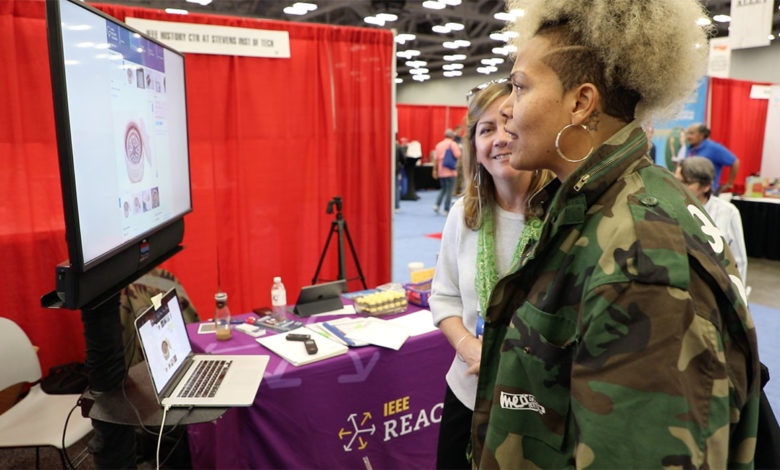
Pictured: Nicole Harris, high school History teacher, Bronx, NY, is amazed with all the resources found within the IEEE REACH Program.
In recent years, the U.S. Department of Education recognized the importance of technology and engineering literacy skills as a necessary component of 21st century skills. The National Assessment Governing Board created a framework for technological literacy skills, wherein:
“The Governing Board sought a framework of technological literacy knowledge and skills that identifies the understandings and applications of technology principles that are important for all students. “Literacy” is defined as the level of knowledge and competencies needed by all students and citizens. People who are literate about technology and engineering are not expected to “do” engineering or produce technology in the professional sense … but rather to encompass general literacy about the use, effects, and designing of technologies.” (National Assessment Governing Board, US Department of Education, 2018)
Based on this framework, first in 2014, and again in 2018, a national assessment for technology and engineering literacy skills, known as TEL, was added to National Assessment of Educational Progress (NAEP), often denoted as the Nation’s Report Card. The TEL assessment measures three areas of technology and engineering literacy: technology and society, design systems, and information and communication technology.
In 2018, the TEL assessment was taken by 8th grade students across the United States. Unfortunately, 54% of students reported skills that were below proficiency levels. IEEE REACH provides resources to teachers and students that address the shortfall in technology and engineering literary skills, specifically the literacy skills associated with technology and society. In addition, the IEEE REACH team continually performs outreach activities to ensure teachers are aware of the program and its free resources, so they may bring to life the history of technology in the classroom and engage students in technology and society literacy skills.
In November of 2019, IEEE REACH was exhibited at the National Council for the Social Studies’ annual conference. More than 100 teachers visited the REACH booth to learn about the free resources. The program was a big hit with teachers, who expressed such comments as: “This is amazing!”; “You had me at free and hooked me with technology!”; “This is just terrific, it’s all right there for you!”; and “As teachers we’re always looking for resources that will engage the students.” Many teachers also commented that the resources could easily be implemented in the classroom. Tyler Madison, an eighth-grade teacher at Walnut Middle School in Grand Island, NE, stated, “I keep bringing my co-workers here because this resource seems like it would be really useful; it fits right in with the stuff we already do in our classrooms.” This conference, along with others attended throughout the year by the IEEE REACH team, has helped the program grow to more than 1,000 subscribers — with the potential to reach over 650,000 students! IEEE, through the REACH Program, is doing its share to close the technology and engineering literacy gap.
In continuing our efforts, we have also added new content to the program. Two new student videos on the Electric Light have posted on the website, Edison, “The Wizard of Menlo Park’s” Electric Light and Edison’s Complete System. And three new student videos on Skyscrapers posted on the REACH website. Additionally, a new inquiry unit (lesson plan) on Electronic Music has also posted on the website.
The REACH team continues its teacher outreach and content development in 2020. Recently, the team presented a workshop on the program to 6th-12th grade Social Studies teachers in Pinellas County, FL, where the program was extremely well received. On 13 March, the team will be presenting the program at the International Technology and Engineering Educators Association’s annual conference in Baltimore, MD, in addition to having an exhibit booth at the event. A new inquiry unit on Information Theory is also in the development stages, thanks to Ray and Carmen Vargas and IEEE’s Information Theory Society, who are supporting the lesson. IEEE REACH continues to provide these free resources to teachers and students in the hopes of ensuring that all students are technologically literate.
We are continually grateful to all those who have supported the program, whether through financial support, as expert talent in the classroom videos, or by sharing the program with local school districts and teachers. IEEE REACH would not be possible without your help. We hope support for the program will continue. Please contact Kelly McKenna, REACH Program Manager at k.mckenna@ieee.org if you have any questions about the program. Donations may be made by visiting https://www.ieeefoundation.org/support_REACH. Together we can close the technology and engineering literacy gap.
Kelly McKenna is REACH Program Manager at the IEEE History Center at the Stevens Institute of Technology in Hoboken, N.J. For more articles by the History Center staff, visit their publications page at: https://ethw.org/Archives:Books_and_Archival_Publications or visit the IEEE History Center’s Web page at: https://www.ieee.org/about/history_center/index.html. The IEEE History Center is partially funded by donations to the History Fund of the IEEE Foundation






